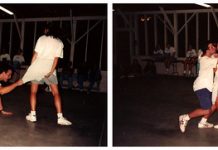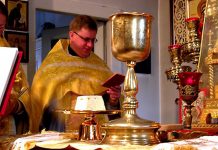Dear Lord God Almighty,
I come to you humbly Lord and thank you for all the many blessings of life that you have given me. I ask Lord, for your forgiveness as to the mistakes I have made against my family, but I know O Lord that you are able to heal me and reverse the mistake that I have made. My husband and I have tried to live the life you Lord have instructed us.You are the giver of life Lord. I ask in the name of Jesus Christ that my tubes and ovaries be healed and I am allowed to conceive for the first time in my life. All things according to your will God. I will praise you anyway Lord. You know heart God and the desire of my heart. I put my faith and trust in you Lord. Amen
Return to Miracle Prayer and Prayer Request
www.praywithme.com
Childbearing proceeded like clockwork for us. I had three daughters in quick succession, with a space of exactly two years between each birth.
But Moriah, my fourth child, was different. After my third daughter was born, I became pregnant, and was scheduled once again to give birth on my third’s daughter’s second birthday. And then for the first time in my life, I miscarried.
The time between my miscarriage and the start of my pregnancy with Moriah were among the saddest months of my life. I grieved for that lost baby that I would never be a mother to, and each month that passed was accompanied by the same stabbing sense of loss that I experienced that terrible winter day when I actually miscarried.
During that time, my loss cast a shadow over every moment of my life, over my mornings spent writing, over my afternoons in the park catching my giggling daughters at the bottom of the slide, over my evenings spent returning phone calls and washing down the kitchen counters.
My loss cast a shadow over every moment of my life
I have never prayed in my life like I prayed during those months to get pregnant again.
The day that I found out I was pregnant with Moriah, I turned to G‑d with thanks and sobbed with joy.
Every day of that pregnancy I asked to be blessed with a “healthy and whole baby,” and I often visited the Western Wall with a prayer book and a full package of tissues. By the time I headed home, the package was nearly empty.
In the end, we named our fourth daughter Moriah, in honor of Mount Moriah where the Western Wall is located. We named her Moriah in honor of the yearning and tears and prayer that poured out of me at that holy place, and which filled the months leading up to Moriah’s conception and her long-anticipated birth.
Moriah is a special baby for me. While I have always believed that the birth of every healthy child is a gift from G‑d, the intensity of my prayers as I awaited Moriah transformed me into a person who feels the truth of this miracle in every ounce of my being. To this day, my awareness that this little girl is a gift from G‑d pulsates through my connection with her.
The eight months following that miscarriage, though traumatic for me, were a blip compared with the suffering of one in seven married women, who statistically, could be afflicted at one point in their marriages with infertility. These are women who struggle with treatment after treatment, year after year, and even decade after decade with a sense of longing that makes my own short-lived yearning seem insignificant by comparison. The difference between my yearning and theirs is the difference between a person who really needs to get outside for a breath of fresh air, and a suffocating person who gasps for oxygen.
Yet my experience, however short-lived, managed to open my eyes to these women who often suffer in silence.
Since that miscarriage, I have kept a list of childless women that I pray for, from my community and from all over the world. And every year, always to my amazement, I cross two or three childless-women-turned-mothers off my list.
When I meet these long-awaited babies, who fly into the world on the tail of thousands upon thousands of prayers, they have a special glow about them. These are children who are equal parts flesh, blood, tears, and longing. These are prayer babies.
These are babies like six-month-old Hodaya. Hodaya was born after five years of marriage, three years of fertility treatments, and a high-risk pregnancy that was spent largely in a hospital bed.
Or like Tehila, who was born two months premature and spent six weeks in an incubator. I prayed for this precious little girl every single day. Every new baby I see makes me smile. But when I met Tehila for the first time yesterday, sleeping in her baby carriage, she gave me goosebumps.
These are babies like eight-month-old Raphael. Five years ago, Raphael’s mother gave birth to a sick baby girl who tragically died several hours after she was born. It took Raphael’s mother two years to become pregnant again, and that pregnancy also ended tragically in a second-trimester miscarriage. A year later, Raphael was conceived.
These are children who are equal parts flesh, blood, tears, and longing
Usually, when I receive a mass email announcing a birth I forward it to my husband, and reply with a hasty email wishing “Mazal Tov!” When I received the email about Raphael, I wept. Then I called his mother, still woozy from the birth, on her cellphone to hear all about it.
To me, these children represent the ultimate picture of hope.
Every baby is a miracle, but the heartfelt prayers that went into every one of these prayer babies makes us see that they are miracles. Our prayers for them open up our eyes, and enable us to see these children for what they really are. For what all children are.
That is the gift of prayer.
On Rosh Hashanah we read the stories of three barren women, Sarah, Rachel, and Hanna. It is their stories of longing for their own prayer babies that should inspire us through this pivotal week leading up to Yom Kippur.
Why are infertile women such a central theme of the High Holidays? Because there are few people in the world who will ever pray with the intensity of a woman who yearns for a child.
These great women teach us how the power of prayer can transform a woman into a matriarch, and a child into a leader of the Jewish people. Prayer accomplishes this, in large part, by clarifying what is truly important.
You don’t pray for your car, or for your manicure, or for your internet connection.
You pray for your children, that they should be good people who will do good things. That they should be the kind of Jews who throughout their lives will create a great light to illuminate the darkness.
Prayer babies are so precious because our prayers for them open our eyes to realize that these children were sent to us special delivery by the Master of the Universe.
During the days leading up to Yom Kippur and on the holiest day of the year itself, let us continue in the tradition of our matriarchs, and pray for our own children like we never have before. And let us pray for those who have yet to have their own children. And let us give strength to those who wonder if they ever will.
But most importantly, let us pray so that we will discover the prayer babies in our own homes, whether they are a month old, or four years old, or thirty-four years old. Whether they were conceived after a decade of fertility treatments, or by their parents’ first anniversary.
Any baby can have the special glow of a prayer baby. All you need to do is open up your mouth and open up your heart.
www.chabad.org











